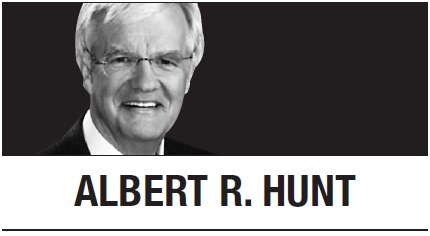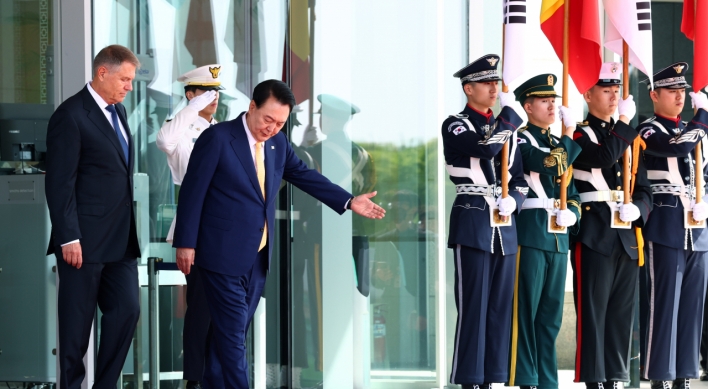 President Donald Trump knows little history. But he can read a short take, so someone should slip him a copy of Dwight Eisenhower’s brief note of June 5, 1944, on the eve of the largest seaborne assault in history, D-Day, with World War II at stake.
President Donald Trump knows little history. But he can read a short take, so someone should slip him a copy of Dwight Eisenhower’s brief note of June 5, 1944, on the eve of the largest seaborne assault in history, D-Day, with World War II at stake.“The troops, the air and the Navy did all that Bravery and devotion to duty could do,” the supreme allied commander wrote in a message he intended to deliver only if the Normandy invasion failed. “If any blame or fault attaches to the attempt, it is mine alone.”
Imagine Trump’s reaction. He’d probably wonder why Ike didn’t blame a British military leader like Field Marshal Bernard Montgomery, or insult Gen. George C. Marshall. And what about President Franklin D. Roosevelt? The Germans are laughing their asses off.
Trump never accepts responsibility for anything. Reflecting the lessons he learned decades ago from his fixer-lawyer-mentor Roy Cohn, his approach is always to stay on the offensive, as if any sign of contrition amounts to an unacceptable show of weakness.
Most of Trump’s blame-spraying during his 14 months in the White House has involved small stuff. Before voters gave the nod last week to a Democratic congressional candidate in a Pennsylvania district that Trump had carried in 2016 by 20 percentage points, the White House sneered that the Republican candidate was weak and that the winner, Conor Lamb, ran as a Trumpite. That was nonsense; Lamb consistently blasted the Republican tax cuts, Trump’s signature legislative achievement. The truth is that Trump’s standing has tumbled.
Trump played the same blame game last fall when Republicans took a beating in the Virginia governor’s race and suffered the loss of an Alabama Senate seat for the first time in 26 years. Trump went out of his way to say that these defeats had nothing to do with him.
OK, that’s just politics, somebody might say, but it’s just as bad when it comes to policy. When the House of Representatives failed last year in its first attempt to repeal Obamacare, Trump first blamed Democrats, then Republican Speaker Paul Ryan, then the right-wing congressmen of the Freedom Caucus. But Republican representatives reported that when they were being lobbied at the White House, Trump’s lack of knowledge was striking, making the task of persuading skeptics tougher.
Trump’s most dangerous evasion of presidential responsibility involves the investigation into possible connections between his campaign and Russian hackers who, according to a US intelligence report, tried to help him win the 2016 election.
Trump started by blaming former President Barack Obama. Confronted with reports that a Kremlin-linked Russian lawyer met secretly with his son and son-in-law, Donald Trump Jr. and Jared Kushner, to dish dirt on Hillary Clinton, he first lied about the purpose of the meeting. Then he blamed it on Obama’s attorney general, Loretta Lynch, on the grounds that the Justice Department had approved a visa for one of the Russian attendees. More recently he has attacked his own attorney general, Jeff Sessions, for failing to hold Obama responsible for Russian election meddling.
If Americans believe that a president won’t admit a mistake, “the public fears he will go on to make the same error again,” said the presidential scholar Michael Beschloss. Acknowledging mistakes, by contrast, shows that a president is “human and learns from his shortcomings, all qualities the public finds attractive in a leader,” Beschloss added.
There are many examples illustrating his point.
In the opening months of John F. Kennedy’s presidency, Cuban refugees directed by the US government invaded Cuba at the Bay of Pigs to try to topple Fidel Castro. They failed. Kennedy, observing that “victory has a thousand fathers and defeat is an orphan,” took the blame. “I am the responsible officer of the government,” he said.
Voters recognized his candor and his approval rose.
A quarter-century later, President Ronald Reagan, embroiled in the Iran-Contra scandal involving attempts by his administration to swap arms for US hostages held in Tehran, ultimately owned up to his mistakes. Of his earlier representation that the US doesn’t trade weapons for hostages, he said: “My heart and my best intentions still tell me that is true. But the facts and evidence tell me it is not. I take full responsibility.”
That admission, Beschloss said, took a scandal threatening Reagan’s presidency and “helped the public to turn the page.”
It would be a disaster if a president had to apologize repeatedly for some long series of errors; that would convey a lack of steadiness and stability.
But when there’s a crisis of the president’s creation -- and there are always a few of those -- there’s a premium on candor and credibility. Trump is incapable of the former, which means he won’t have the latter.
Albert R. Hunt---
Albert R. Hunt is a Bloomberg View columnist. -- Ed.
(Bloomberg)


![[AtoZ into Korean mind] Humor in Korea: Navigating the line between what's funny and not](http://res.heraldm.com/phpwas/restmb_idxmake.php?idx=644&simg=/content/image/2024/04/22/20240422050642_0.jpg&u=)



![[Herald Interview] Why Toss invited hackers to penetrate its system](http://res.heraldm.com/phpwas/restmb_idxmake.php?idx=644&simg=/content/image/2024/04/22/20240422050569_0.jpg&u=20240422150649)

![[Graphic News] 77% of young Koreans still financially dependent](http://res.heraldm.com/phpwas/restmb_idxmake.php?idx=644&simg=/content/image/2024/04/22/20240422050762_0.gif&u=)





![[Exclusive] Korean military to ban iPhones over security issues](http://res.heraldm.com/phpwas/restmb_idxmake.php?idx=652&simg=/content/image/2024/04/23/20240423050599_0.jpg&u=)



